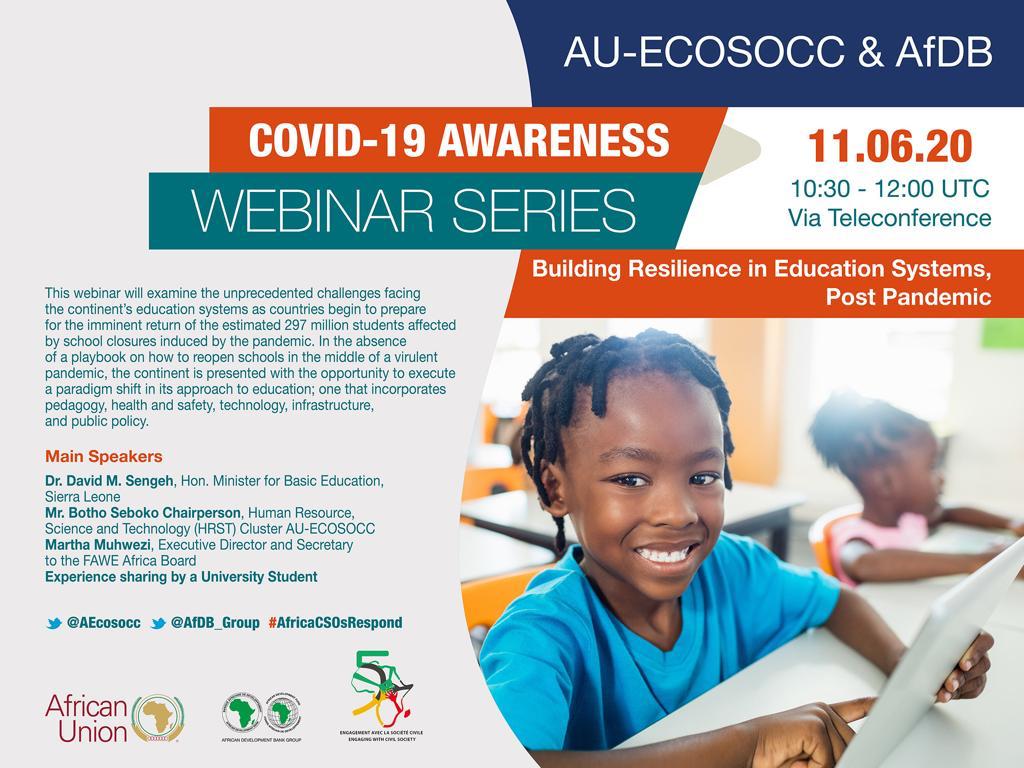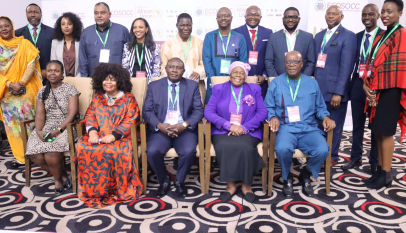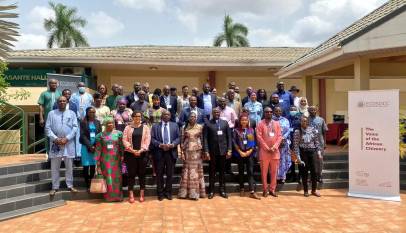Building resilience in Africa’s education systems, post COVID-19
As African governments began plans for the reopening of schools, AU ECOSOCC and AfDB Gender, Women and Civil Society Department’s last bi-weekly COVID-19 awareness webinar series focused on the theme: Building resilience in education systems, post pandemic

One of the fallouts of the COVID-19 pandemic across the globe is the closure of schools – from basic to tertiary educational institutions. The temporary closure of schools by governments around the world was part of efforts to mitigate and contain the spread of the pandemic. Consequently, the closure of educational institutions has impacted over 1.5 billion students globally, which represent more than 90% of global students’ population.
In Africa, starting from mid-March, countries commenced closing down basic schools and higher education institutions. However, as schools were being closed down, governments were also experimenting with alternative forms of learning for students, particularly e-learning and distance learning. But as African countries began to adopt the, radio, mobile internet technology and television-based learnings, education stakeholders’ major concern remained the inclusivity of the new systems or rather ensuring no one was left behind.
These concern was borne out of the apparent constraints around availability and accessibility of internet-based learning and other forms of educational technology (edtech) for majority of African students, from basic to tertiary levels. Other concerns are to do with the teachers’ capacity to adopt such innovative forms learning and also the students’ lack of access to basic infrastructure for technology-based learning namely, computer systems and electricity supply. Hence, the anxiety that majority of students in Africa would not be able to benefit from such otherwise laudable and innovative initiatives.
Thus, as governments across the continent began announcing plans for the reopening of schools for the resumption of teaching and learning activities, the African Union Economic, Social and Cultural Council (AU ECOSOCC) and the African Development Bank (AfDB)’s Gender, Women and Civil Society Department, in support of Africa’s recovery efforts against the COVID-19 pandemic, dedicated last edition of their bi-weekly COVID-19 awareness webinar series to the theme: Building resilience in education systems, post pandemic.
As African countries prepare for the return to school of around 300 million students, the webinar discussion examined the unprecedented challenges facing the countries’ education systems, in the absence of a comprehensive strategy on how to reopen schools, amidst the surge in number of COVID-19 infections across the continent. Education stakeholders at the webinar were of the opinion that the pandemic presented Africa with a unique opportunity for a paradigm shift and evolution of its education systems.
One of the speakers, Dr David Sengeh, Sierra Leone’s education minister and Chief Innovation Officer for the country’s Directorate of Science, Technology and Innovation, believes if African countries’ outmoded and obsolete education systems didn’t change and evolve after the COVID-19 pandemic, the continent would have lost a significant opportunity. “Our existing schooling system for hundreds of years has to change for the world we live in today. It’s why the skillset students have after graduating from school doesn’t match what employees and the society need,” Sengeh noted.
“It doesn’t match the problem-solving necessary for societal transformation across all governance spectrums. This is not just about resilience; it’s about evolution, this is about the transformation of our education systems. And this is the question we all need to ask as parents, policymakers; we need to ask new questions about learners and learning i.e who are the learners? What are the skillsets that need to be taught in schools? Where does learning take place?”
Dr Sengeh said for African countries’ education systems to deliver twenty-first century skills to learners, the learning process needed to address five important Cs, namely; Civics, Critical Thinking, Creativity, Comprehension, as well as Computational Thinking, adding that modern education systems were required to be hybrid in nature – blending varied platforms for learning including mobile internet connectivity, radio and paper-based learning systems.
Botho Seboko, chairperson of the Human Resources, Science and Technology (HRST) cluster of AU ECOSOCC, agrees with Dr Sangeh, noting that as it responds to the COVID-19 pandemic, Africa shouldn’t only be focused on adapting resilient measures for the education sector; instead, should also explore the evolution of the sector. He said the pandemic was threatening the continent’s hard-earned gains in the education sector.
“Resilience in the education sector, from our understanding as a cluster, is the ability of learners, schools, communities and institutions to absorb, adapt and transform in the face of adversity; in order to create sustained, measurable improvements in learning outcomes and equitable access for all learners. It is important to note that quality, accessible, equitable and safe education services also strengthen a range of cross-sectoral outcomes that reinforce resilience of people, households and communities,” he said.
Seboko noted that post COVID-19, building resilience in Africa’s education systems was vital to ensuring that all children had access to safe, qualitative and equitable education, calling on African governments to integrate new technologies in learning systems so as to help African students compete favorably among students from other parts of the world. He urged the governments to develop more political will towards supporting education through increased budgetary allocations.
In her remarks, Martha Muhwezi, executive director cum board secretary of the Forum for African Women Educationalists (FAWE –Africa) described education as a basic right, therefore cautioning African governments on the importance of leaving no one behind as they began adopting edtech in learning, in the post COVID-19 period. “It is common knowledge and understanding that not everyone can access technology for learning; it calls for laptops, computers, internet connection and not everybody can access them,” she said.
Muhwezi therefore said, as African governments were implementing technology-based educational policies (e-learning), they must put in place mechanisms that would guarantee no one was left behind; ensure school teachers had the capacity to adopt the new teaching methods; as well as providing the necessary technology infrastructure in schools to support e-learning.
While sharing her learning experience during the pandemic, Sabrine Khaloub, a student at Cadi Ayyad University in Marrakesh, Morocco, said the onset of the pandemic led to apprehension among her varsity’s students. Later, she said, the university created an online platform from where students could access exercises and assignments. She however said studying on their own from home through computers and text books was initially very challenging until “some of our lecturers began coaching us through webinars and providing access to e-libraries and resources which made us became confident and gained trust in the school system.”
















